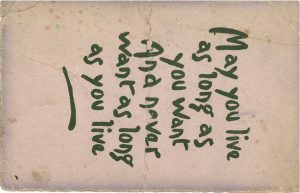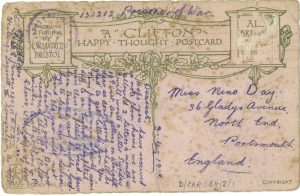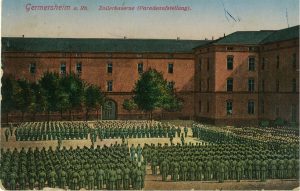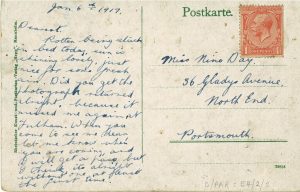During World War One it took only two days for a letter to reach the front. By the war’s end, two billion letters and 114 million parcels had been sent and received by Britain. A few of these have been deposited in the archives and offer a personal perspective on the war.
Gifts from home

Letters home often featured thanks for letters or other tokens sent to the troops. In 1914 and 1915, soldiers serving in the Dorset Regiment received parcels from children in Godmanstone (ref: PE-GOD/MI/2/2). These contained cigarettes and lighters which were very much appreciated by the men, illustrated by the letters of thanks sent to the parish:
“We are writing to you to ask you to thank the children for sending those cigarettes and Christmas presents, which we was so glad to receive. We were more than pleased to think we were not forgotten, and to think that they gave their little presents that they might have had, for us.”

Football in the trenches
Then, as now, football was a popular leisure activity. Several of our letters from the trenches mention matches played between battalions and with troops from other countries. Captain Brian W. Fagan was optimistic about his team’s chances (ref: D-302/1):
“There are company football matches nowadays. We have got through into the finals and are only waiting for our rivals to be decided upon. We ought to win alright I think. D Company has never been beaten at football yet, the men are fearfully keen on it…
We lost 4 – 1 in the end, but weren’t nearly so bad as that really.” 26th January 1916
Prisoner of War camps
Two postcards in the collection were sent by Len Parsons from Germersheim prisoner of war camp, Germany, to Miss Nino Day (ref: D-PAR/E/4/1-2). Len writes:
“…we are allowed 2 letters a month so I will write a letter Sunday 12th…
Time passes very slowly some diff[erence?] to an English hospital where there is plenty to read. Have been treated very kindly. Good-bye, to leave now, eh’, never mind the war will not last for ever” Dated 3rd April 1918
Flora and fauna
In letters to his fiance (ref: D-302/1), Captain Fagan wrote poetically about the scenery and wildlife to be found around the trenches:
“Some of the sunrises have been magnificent; one day in the trenches I heard a lark in No Man’s Land. And when we got back here, there was a Nightingale singing. I saw a cat lose one of its 9 lives this afternoon.” 20th March 1916
“We had a great rat hunt in the afternoon all round the old trenches near the camp, with our 2 dogs Cox and Kitchy, who have become institutions now… Cox is a jolly good ratter, but Kitchy is no good at all now, and was very bored all the afternoon.” 24th February 1917
These documents can all be viewed in their entirety for free at Dorset History Centre.





